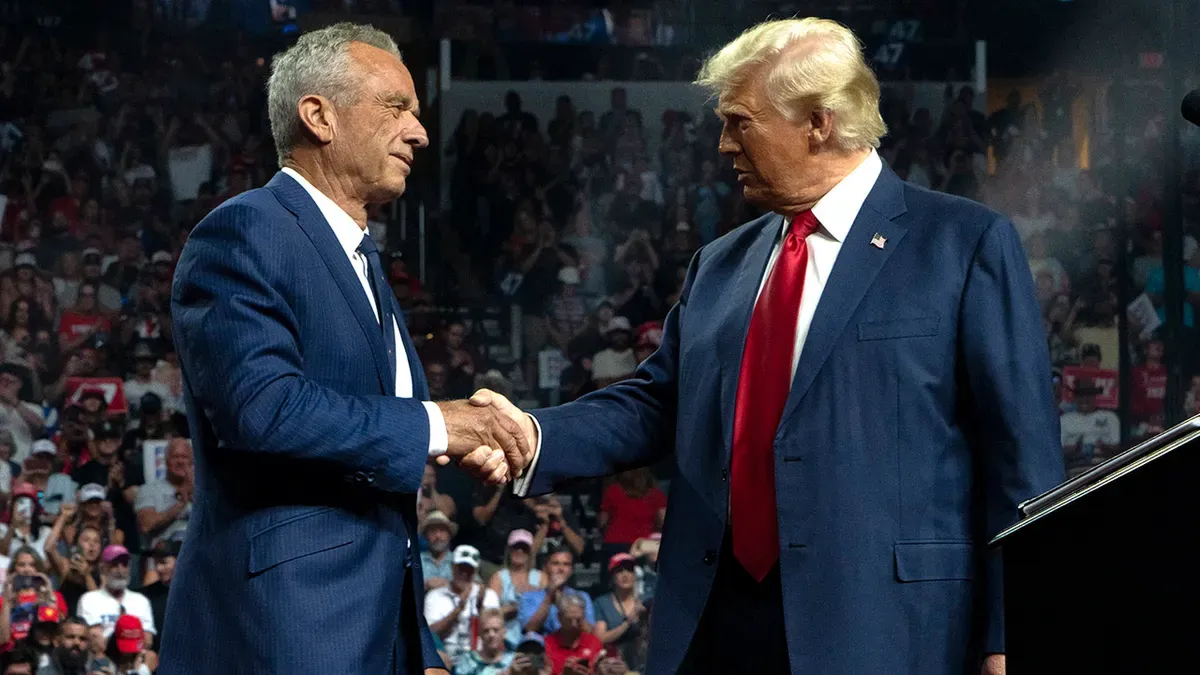RFK Jr. Is Replicating Bernie Sanders’ Sheepdog Play for MAGA

I have come to suspect that RFK Jr. is playing a role similar to that of Bernie Sanders in the 2016 election. Bernie served as a “sheepdog,” using working class populism and “dissident” credentials to herd voters largely disillusioned with the establishment party candidates to vote for one, with the belief being that his endorsement of Clinton would somehow “push her left.” Now, RFK Jr. is using working class populist rhetoric and his Covid dissident credentials to herd voters disillusioned by Trump and Biden-era Covid policies into the Trump fold.
RFK Jr. continues to speak about popular policies from his campaign, many of which have NOT been publicly endorsed by Trump or Vance in any capacity, and is creating the impression that the policies he is currently espousing will be Trump’s policies if elected. There is no guarantee this is so. There is no citable commitment from the Trump camp giving RFK Jr. any real power in the administration, he is not even a suggested cabinet pick for HHS per recent reports citing Trump’s transition team (picks are being chosen by Howard Lutnick, Epstein’s former neighbor tied to Tether and Steve Mnuchin-chaired Satellogic).
In addition, right before RFK Jr endorsed Trump, his VP pick Shanahan said they would not endorse without Trump admitting that his administration’s Covid-era policies were wrong and highly damaging. There is no indication that Trump ever made this admission privately and there is no proof he has said so publicly. However, Shanahan’s statement shortly before the endorsement created the impression that the endorsement meant Trump had admitted his Covid-era policies were wrong. Yet, before Shanahan’s pre-endorsement claims, it had already been reported that Kennedy would be moving to endorse Trump.
The move was clever, as it gave Trump plausible deniability about his current stance on his Covid-era policies (e.g. mRNA vaccines) and it made it appear that Kennedy had stood strong to his opposition to those same policies and had perhaps influenced Trump in those matters. There is no indication that happened or that Trump committed to giving Kennedy a government appointment that would afford him any real influence over a future Trump administration’s healthcare, agricultural or environmental policies in exchange for Kennedy’s endorsement.
Since the endorsement, there appears to be a deliberate effort to conflate Kennedy’s espoused policy goals with policies that will actually be pursued by a future Trump administration in any way. For instance, one cause long associated with Kennedy is an opposition to both genetically engineered seeds and genetically engineered vaccinations. With Trump having made no public acknowledgement that he views the mRNA vaccines as dangerous, Kennedy’s current rhetoric and his long-standing opposition to these things creates the impression that Trump does now view them as dangerous.
However, this is unlikely as Trump has a history of deregulating the biotechnology industry, particularly with respect to GMO crops, and his VP pick – JD Vance – and other figures close to his campaign like Elon Musk and Vivek Ramaswamy have significant investments in biotechnology firms that produce genetically engineered organisms. Any sort of meaningful regulation or government policy that would reduce or remove GMOs from the food supply or scrutinize the safety and efficiency of mRNA or DNA vaccines (or other biotech products marketed as health interventions) would invariably affect the investments of some of Trump’s most important backers as well as his vice presidential candidate. Thus, Trump’s most likely policy with respect to genetic engineering is seemingly being masked by his association with Kennedy and the rhetoric Kennedy espouses alongside his calls to vote Trump back into office. This is not just limited to genetic engineering, it is also true too for digital biometric ID (which Trump advanced while in office and important Trump backers are funding/creating the infrastructure for it).
If you want a desired policy, the public must presumably pressure politicians to implement those policies on the public’s behalf. What is happening here is an apparent psyop to create the appearance to the public that desired policies will be adopted, masking the more likely policy to be implemented and preventing any sort of pressure from actually being applied to the Trump campaign that these policies are important to many American voters. It is a means of manufacturing excitement to rally the public behind a politician, while also shielding that politician from public pressure or from apologizing for past policy errors. It is making Trump’s policies appear more populist than his policy commitments and past policy record actually suggest they are and, in doing so, Kennedy is doing a disservice to many of the causes he has long advocated for by not securing public policy commitments (or even private ones that are publicly reported) or by not really applying any pressure at all that is verifiable (merely assumed). Ultimately, those who would normally be the first to resist certain policies (like GMOs, digital ID) and demand policy commitments to prevent their implementation, are being led to embrace someone who, in his last term, advanced the policies they most oppose.
It’s also important to note that this phenomena is not limited to RFK and his team (or Trump and his team). Popular figures on social media and the podcast circuit, like Ian Carroll and Eric Weinstein, have made a point of conflating Kennedy’s past and current rhetoric with current Trump policy commitments, but it is not clear if they are aware of the tactic and playing along or are its victims.
